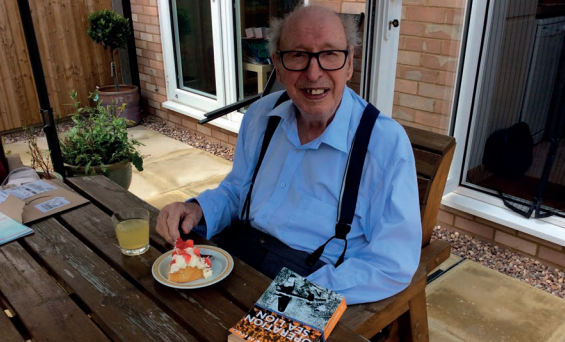February 2021
Cath Littler picks the positives out of a difficult and emotional year, including being inspired by students’ resilience and hard work.
When the first lockdown started it felt a bit like everyone had joined our world. We were already working from home, sharing documents and making video calls. We were restricted by the need to care for my father (aged 97) who lived with us but could not be left on his own for more than an hour or so. We couldn’t see how we were going to get to the pub, never mind take a holiday, without leaving Dad in the care of strangers – we needed the Grandad equivalent of a babysitter!
Suddenly I was an expert in a new field, that of remote working. There was a rush of articles and advice on how to successfully work from home and most of them got it fairly correct.
As the pandemic progressed, Dad deteriorated. However, as I struggled with the stress of working, shielding, caring/nursing and then bereavement, I found support from my co-remote workers and inspiration from the way that many tutors and students took up the challenge of teaching and studying online, not letting anything get in their way.

The book and a cream cake were very typical! He was an electronic engineer, having attended Heriot Watt in Edinburgh where anyone who failed an exam got called up – no resits!
When he completed his course he was called up anyway, but when told what to say to the recruiters he ensured that his skills were used properly. He joined the RAF for the rest of WW2, which he spent in Calcutta, India, building Radar sets to track aircraft.
In my various roles, I have spoken to many students and heard stories about using furlough time to catch up on studies. Some lost their jobs but were really determined to get new ones – and were succeeding. At times planned study courses were missed, so students self-studied rather than wait for a new course. Many students took it further, whether they were furloughed or not. They did their own research on tax changes and the furlough rules to make themselves ready to give businesses advice. I never spoke to a student who was not working hard to succeed.
That’s not to say that all students were in this group. Wellbeing calls from providers offered some support but some struggled to cope and took a study break, and we can’t be disappointed with that.
The way that many managed having their children at home while working was also inspirational. Strict routines of study and work became the norm and dashing out of a meeting to sort out a problem became something that not only I did but everyone else now does, too.
Effective teaching online is really difficult.
Simply talking over a presentation is easy but getting feedback from students is challenging and the chat function is limited. I have found ‘polls’ and ‘breakout rooms’ functions helpful, but some tutors have been taking it technologically further and others are delivering lessons to very small groups, repeating as required.
Written practice is always challenging for AAT tutors and students. Shared documents and forums have allowed groups to work together and tutors have spent hours marking and answering emails. Some have introduced anonymised online peer marking which helps with both teacher workload and student understanding.
So 2020 was a difficult year, but we can all take inspiration from the way that we have adapted our teaching and learning, discovered new skills and generally risen to our challenges.
• Cath Littler consults for AAT and Mindful Education




